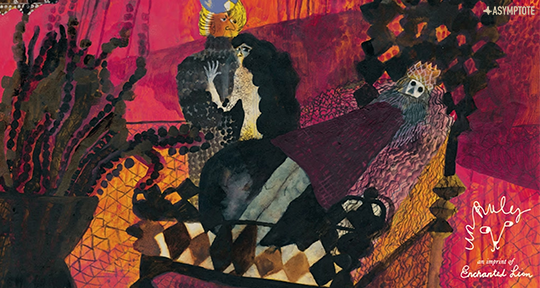The art of book illustration has long accompanied the story in its imaginary expeditions—to vivify settings, to enrich character, and to extend language along sensorial planes. Yet, in contemporary publishing, there are few fictions for older readers that truly explore this complex reciprocity between image and text. In fall of 2020, the independent press Enchanted Lion addressed this lack with the announcement of Unruly: a new imprint that would be dedicated to “the picture book’s full potential for readers of all ages”. This was followed by the issuing of several titles dedicated to the dialogues between visual and literary languages, manifesting in enthralling alternatives of description, evocation, and narrative realities. In the following essay, Colin Leemarshall takes a close look on the three works out now.
In the popular imagination, the picture book is a highly circumscribed form. The apparent consensus—fomented both by market protocols and by entrenched reading habits—is that picture-heavy storybooks are for children up to the age of about eight; beyond this age, children are expected to graduate to chapter books, then to young adult novels, then finally (it is hoped) to sophisticated adult literature. (Those who remain drawn to the artistic gestalt of text and image have recourse to the graphic novel—a form that is now widely afforded the status of ‘serious’ literature.) This imagined trajectory not only obscures the fact that the world of illustrated children’s literature has always had its more provocative practitioners (from Heinrich Hoffmann to Tomi Ungerer), it also erects an unnecessary palisade against any ‘incursions’ from the adult world.
The New York-based Enchanted Lion seems to be one of the few anglophone presses invested in upending this prejudice. The publisher has long been open to putting out more challenging and unexpected works, and several of the books on its main title list might be said to be as much for adults as for children. However, it wasn’t until fairly recently, with the 2021 establishment of its Unruly imprint, that Enchanted Lion canalised these preferences into something more systematic. On its website, the publisher writes:
We’re launching Unruly because we believe that the possibilities for the illustrated book are larger and richer than the categories of board book, children’s picture book, graphic novel, and art book that currently exist [….] Picture books are rich with design and story, and yet the genre has come to be seen as one strictly for children. At Enchanted Lion, picture books are for readers of all ages, and sparking awareness of this boundlessness might finally be what is needed to allow the unique form that is the picture book—where word and image live together as nowhere else—to be seen as the expansive narrative medium it is.



